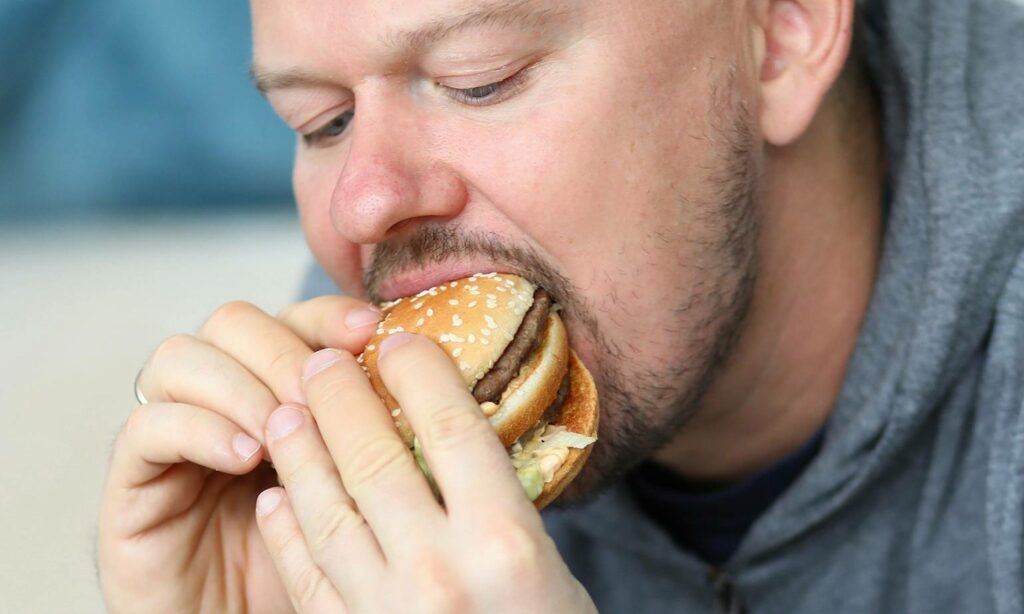Do you eat when you’re not hungry? Do you feel like you can’t stop eating even though you’re full? If so, then you may be struggling with compulsive overeating. Compulsive overeating is a serious eating disorder that can have devastating consequences for your health and your life. In this blog post, we will discuss what causes compulsive overeating and how to stop it. We will also provide resources for those who need help getting treatment.
Contents
What Does Compulsive Overeating Mean?
 Compulsive overeating is an eating disorder that is characterized by episodes of binge eating followed by a feeling of guilt or shame. People who suffer from this disorder often feel out of control when it comes to their eating habits and may use food as a way to cope with negative emotions.
Compulsive overeating is an eating disorder that is characterized by episodes of binge eating followed by a feeling of guilt or shame. People who suffer from this disorder often feel out of control when it comes to their eating habits and may use food as a way to cope with negative emotions.
Many people described this feeling as being “addicted” to food. While there is no definitive cause of compulsive overeating, there are several factors that may contribute to its development. It is believed that compulsive overeating is an emotional disorder that is caused by a combination of factors.
Compulsive overeating often begins in childhood or adolescence. It is more common among girls than boys and is more prevalent in families where there is a history of eating disorders. People who suffer from compulsive overeating are also more likely to suffer from other mental health disorders.
Therefore, if you feel like eating is taking over your life and you can’t control your eating habits, it is important to seek professional help. There are many treatment options available for compulsive overeating and with time, you can learn how to control your urges and develop healthy eating habits.
How Does It Look Like?
Compulsive overeating often starts out innocently enough. Maybe you love food and enjoy cooking and eating. But then, bit by bit, it becomes more and more important to you. You start thinking about food all the time. For example, you might:
- Think about what you’re going to eat next even when you’re not hungry
- Eat even when you’re full or not feeling well
- Hide food so you can eat it in secret
- Feel guilty or ashamed after eating
In addition, there are some physical signs that may indicate compulsive overeating, such as:
- Weight gain
- Stomach pain
- Chronic indigestion or heartburn
- Tired all the time
- Sleep problems
This happens because when you compulsively overeat, you’re not just eating too much food. You’re also using food to cope with difficult emotions or situations. This can be a way to numb or avoid dealing with what’s going on in your life. But it’s only a temporary fix. In the long run, it can make things worse.
Therefore, if you think you might be compulsively overeating, it’s important to get help. Talk to your doctor or mental health professional about what you’re going through. They can provide support and resources to help you make healthy changes.
Why Do I Compulsively Overeat?
 There are a variety of reasons why someone might compulsively overeat. Some of the reasons are:
There are a variety of reasons why someone might compulsively overeat. Some of the reasons are:
- To cope with stress: When we’re under a lot of pressure, sometimes our first instinct is to comfort ourselves with food. This is because when we’re stressed, our bodies release the hormone cortisol, which can increase our appetite.
- To fill an emotional void: Sometimes we turn to food when we’re feeling lonely or sad. This is because when we’re feeling emotional, we’re not getting the satisfaction that we need from other areas of our life.
- To satisfy a craving: Sometimes we just have a really strong craving for a portion of certain food and we can’t resist eating it. This is because our brains are wired to want certain types of foods that are high in fat and sugar.
- To make up for a lack of sleep: When we’re tired, our bodies crave high-energy foods to try to make up for the lack of sleep. This is because when we’re tired, our bodies release the hormone ghrelin, which increases our appetite.
- Self-medication: In some cases, people try to self-medicate with food. This is because when we’re struggling with mental health issues like depression or anxiety, we might turn to food for comfort.
- Learned behavior from childhood: This might be the case if you grew up in a family where emotional eating was the norm. If you saw your parents or other family members using food to cope with their emotions, you might have learned to do the same thing.
Overall, these might be some of the reasons why you compulsively overeat. If you’re looking to stop, there are a few things you can do. So do not feel discouraged.
What Are The Consequences?
When you compulsively overeat, you might not realize the consequences until it’s too late. You might think that you’re just eating for fun or because you’re bored, but overeating can lead to some serious health problems. Some serious consequences of compulsive overeating might be:
- Weight gain
- High blood pressure
- Heart disease
- Diabetes
- Stroke
- Cancer
These are just a few of the many health problems that can be caused by compulsive overeating. If you think you might be a compulsive overeater, it’s important to seek help from a professional. They can help you figure out what’s causing your overeating and how to stop it.
Compulsive overeating is a serious problem that can have devastating consequences. If you think you might be a compulsive overeater, seek help from a professional. They can help you figure out what’s causing your overeating and how to stop it.
How Can I Stop Compulsive Overeating?
 If you are struggling with compulsive overeating, know that you are not alone. This is a common issue that many people face. There are a few things that you can do to stop compulsive overeating. Here are a few tips to help you out:
If you are struggling with compulsive overeating, know that you are not alone. This is a common issue that many people face. There are a few things that you can do to stop compulsive overeating. Here are a few tips to help you out:
Identify your triggers
this is one of the most important things that you can do. If you can figure out what causes you to overeat, you can then avoid those situations or triggers. For instance, some people overeat when they are bored, so if you know that this is a trigger for you, find something else to do when you are bored instead of eating.
Plan your meals
In compulsive overeating, it is very important to plan your meals. This will help you control your portions and make healthier choices. Meal planning can be as simple as making a grocery list or using a meal prep service. If you are going to eat out, choose restaurants that have healthy options. Avoid fast food places and buffet-style restaurants. When you are at a restaurant, order an appetizer or salad as your main dish.
Avoid restrictive diets
People who are struggling with compulsive overeating often turn to restrictive diets in an attempt to control their eating. However, this can actually make the problem worse. Restrictive diets can lead to feelings of deprivation and trigger binge eating. Instead of going on a diet, focus on making healthy choices and eating when you’re hungry.
Get regular exercise
One of the best things you can do for your health is to get regular exercise. It doesn’t have to be anything too strenuous – even a daily walk will help. Exercise has been shown to improve mental health, increase energy levels and help with weight loss. If you’re struggling to motivate yourself, try joining a gym or exercising with friends.
Track your eating habits
If you want to change your eating habits, it’s important to become aware of what you’re currently doing. Start by keeping a food diary for a week or two, noting down everything you eat and drink. This will help you to identify any patterns in your eating habits. Once you’re aware of your eating patterns, you can start to make changes.
For example, if you tend to snack on unhealthy foods when you’re bored or stressed, try to find alternative activities that will help you to relax or distract yourself. If you eat large meals because you’re ravenous by the time you sit down to eat, try eating smaller meals more often throughout the day.
Change your environment
It is important to identify your triggers and work on changing your environment so that you are not constantly exposed to them. This may mean avoiding certain places or situations, or it may mean keeping certain foods out of the house. If you have trouble controlling yourself around a certain food, it is best to avoid having it in the house altogether.
Prioritize sleep
Sometimes, lack of sleep can be a trigger for overeating. When you’re sleep-deprived, your body craves energy from food. To avoid this, make sure to get enough sleep every night. You should also avoid eating late at night, as this can make it harder to sleep. For this, you can try to eat earlier in the evening and avoid caffeine after lunchtime.
Practice relaxation techniques
 This can be anything from yoga to meditation. Relaxation techniques help you focus on the present moment and let go of thoughts about food. For example, when you feel the urge to overeat, you can close your eyes and take a few deep breaths.
This can be anything from yoga to meditation. Relaxation techniques help you focus on the present moment and let go of thoughts about food. For example, when you feel the urge to overeat, you can close your eyes and take a few deep breaths.
You can also try progressive muscle relaxation. This involves tensing and relaxing different muscle groups in your body. Start with your toes and work your way up to your head. Tense each muscle group for about five seconds before relaxing it.
Seek professional help
If you are feeling like you are struggling with compulsive overeating, please reach out to a professional for help. This is not something that you have to go through alone and some people can help you get on track. There are a few different types of therapy that can be effective in treating compulsive overeating. These include:
- Cognitive behavioral therapy (CBT)
- Interpersonal therapy
- Dialectical behavioral therapy (DBT)
Seeking professional help is a great step in getting your life back on track. If you are struggling with compulsive overeating, please don’t hesitate to reach out for help. Many people care and want to see you succeed. You can do this!
Conclusion
All in all, compulsive overeating can be a very difficult thing to deal with. It can be hard to overcome on your own, but with the help of a therapist or counselor, you can begin to understand the root cause of your overeating and start to work towards changing your relationship with food.
You can overcome only when you have the right mindset and when you want to change for yourself. Change is hard, but it’s definitely possible. If you are struggling with compulsive overeating, please reach out for help—you deserve it!
For more information and guidance please get in touch with our expert therapists at Therapy Mantra. They will be more than happy to assist you on your journey to recovery. Contact us today to learn more about our services. You can also book an online therapy session or download our free Android or iOS app.


